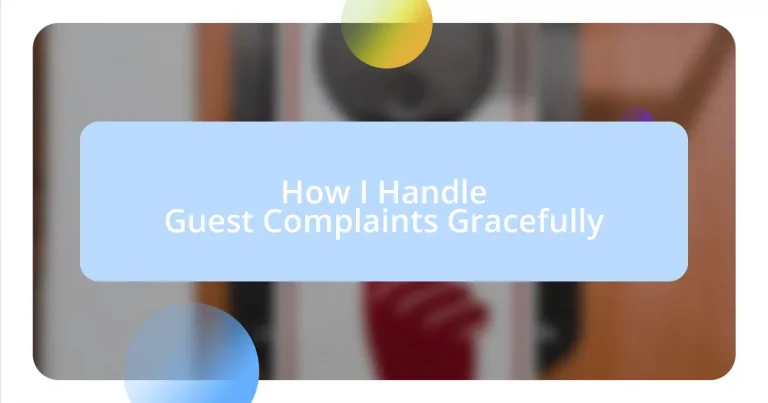Key takeaways:
- Understanding guest complaints involves empathy, active listening, and recognizing the emotional context behind their issues.
- Effective communication techniques, like mirroring emotions and using clear language, can transform complaints into opportunities for connection.
- Follow-ups after resolving complaints significantly enhance guest satisfaction and demonstrate genuine care.
- Learning from complaints fosters growth and improvement in service practices, benefiting both guests and staff culture.

Understanding Guest Complaints
Understanding guest complaints often requires us to step into their shoes. I remember a time when a guest expressed frustration over a room that wasn’t cleaned to their expectations. I could almost feel their disappointment and realized that what might seem minor to one person can deeply affect another’s experience.
When guests voice their concerns, it’s not just about the surface issue. I sometimes find myself wondering what led to their emotion. Is it the inconvenience of having to wait for a resolution, or does it tie into a larger experience they were looking forward to? This deeper connection to their feelings helps me respond with empathy.
Moreover, I’ve found that active listening is crucial. One guest once told me about a special occasion they were celebrating, and the slightest hiccup had the potential to tarnish their pleasure. By acknowledging their emotions, I inadvertently gained their trust, which often makes resolving the issue smoother and more effective. Doesn’t it feel rewarding knowing you can turn a negative experience into a positive one?
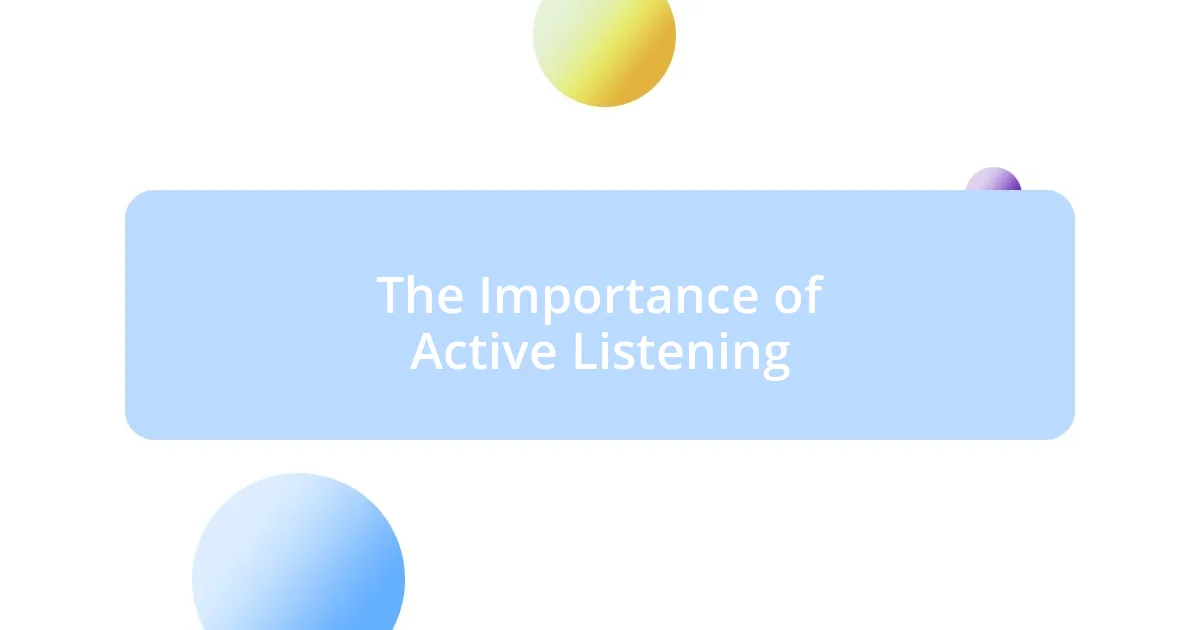
The Importance of Active Listening
Active listening is pivotal when addressing guest complaints. I recall a situation where a guest expressed dissatisfaction with the food options available. As I attentively listened to their feedback, I could sense their frustration bubbling beneath the surface. It wasn’t just about the menu—it was tied to their expectations for a great dining experience. By focusing intently on what they were saying, I not only demonstrated that I valued their opinion but also unlocked the opportunity to learn what they genuinely wanted.
Understanding the nuances behind a complaint requires patience and a willingness to engage. I remember another guest who felt unheard after multiple complaints about noise levels. Instead of jumping straight to solutions, I took a moment to let them share their story. Hearing the details—their fatigue from travel and desire for peace—allowed me to respond thoughtfully. This approach transformed what could have been a tense exchange into a collaborative conversation aimed at finding a solution.
When I reflect on my experiences, it becomes clear that active listening does more than resolve issues; it fosters a bond of trust. When guests feel heard, like the one who simply wanted to share their excitement for their wedding anniversary, they often become more forgiving. I’ve seen how a small act of listening can pave the way for genuine connections that persist well beyond the immediate complaint. Isn’t it fascinating how taking the time to listen can reshape interactions?
| Active Listening Benefits | Traditional Approach |
|---|---|
| Builds Trust | Can create distance |
| Encourages Ownership | Less engagement |
| Uncovers Deeper Issues | Surface-level responses |
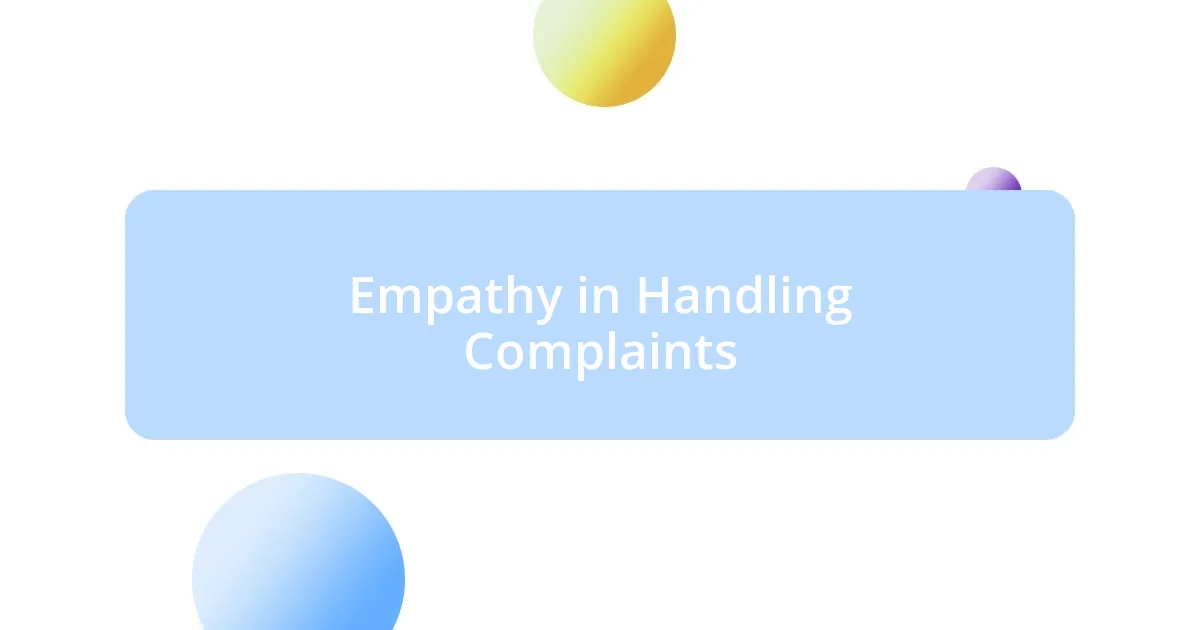
Empathy in Handling Complaints
Empathy plays a vital role in managing guest complaints. I once encountered a guest who was visibly upset about a reservation mix-up. Their frustration reminded me that, beneath each complaint lies a human experience—sometimes rife with emotions that stem from previous disappointments or high expectations. I made a point to express genuine concern, which helped to not only de-escalate the situation but allowed us both to connect on a more personal level. This can often lead to a more open dialogue about their needs.
Here are some insights on how empathy enhances complaint resolution:
- It allows guests to feel validated in their feelings.
- Empathetic responses often encourage a calmer atmosphere.
- Building rapport can lead to more constructive conversations.
- When guests sense your concern, their defensiveness diminishes.
- Real emotional connections pave the way for loyalty and repeat visits.
By embedding empathy into our interactions, I find that complaints shift from being mere issues to opportunities for valuable engagement.
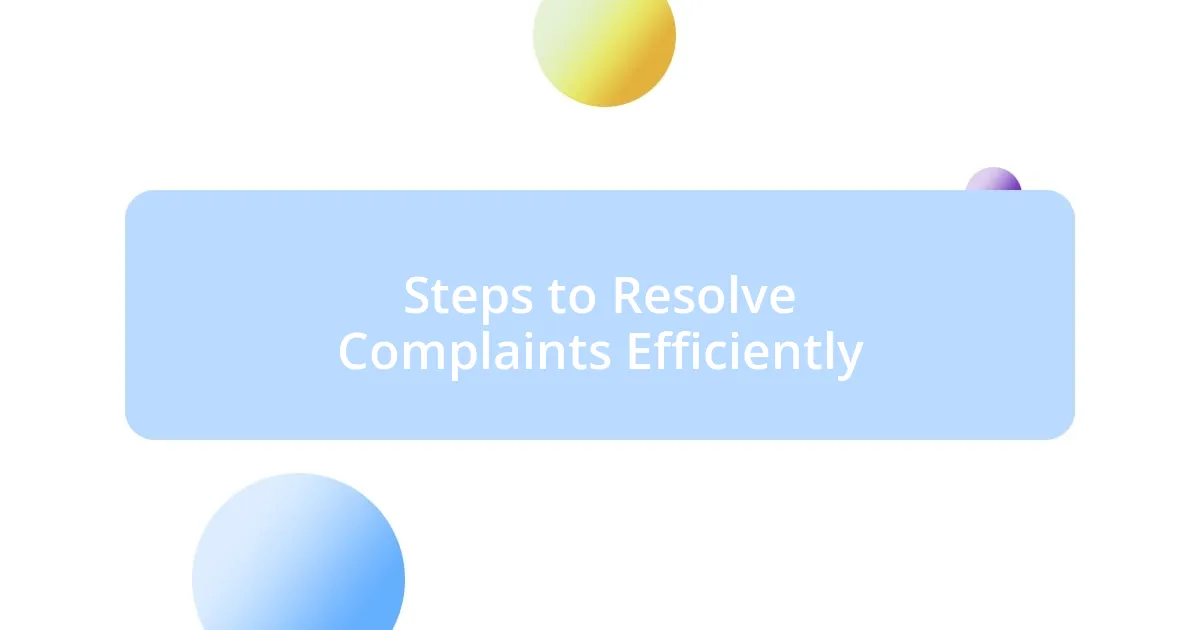
Steps to Resolve Complaints Efficiently
When resolving complaints efficiently, the first step I take is acknowledging the issue promptly and sincerely. I remember a time when a couple was disappointed with the temperature of their room. Instead of just apologizing mechanically, I said, “I completely understand how uncomfortable that must feel, especially after a long day.” That simple statement made them feel seen, and it set the tone for a more fruitful discussion.
The next crucial step I employ is to offer a solution tailored to the guest’s needs. I once received a complaint about long wait times for service. Following my acknowledgment, I said, “I’d hate for you to feel neglected while you’re here. If you’re comfortable, I can check in on your order directly or offer you a complimentary appetizer while you wait.” I realized that personalizing the response not only addresses the complaint but also enhances the guest’s overall experience.
Finally, I always follow up after implementing the solution to ensure the guest is satisfied. After I resolved the earlier issue with the couple, I checked in later with them while they enjoyed their stay. They expressed their gratitude, saying, “You really cared about making our stay enjoyable.” That follow-up not only reinforced my commitment to their experience but also turned potential dissatisfaction into a memorable moment of service that they would likely share with others. Don’t you think that such follow-ups can make a world of difference in perceived care?
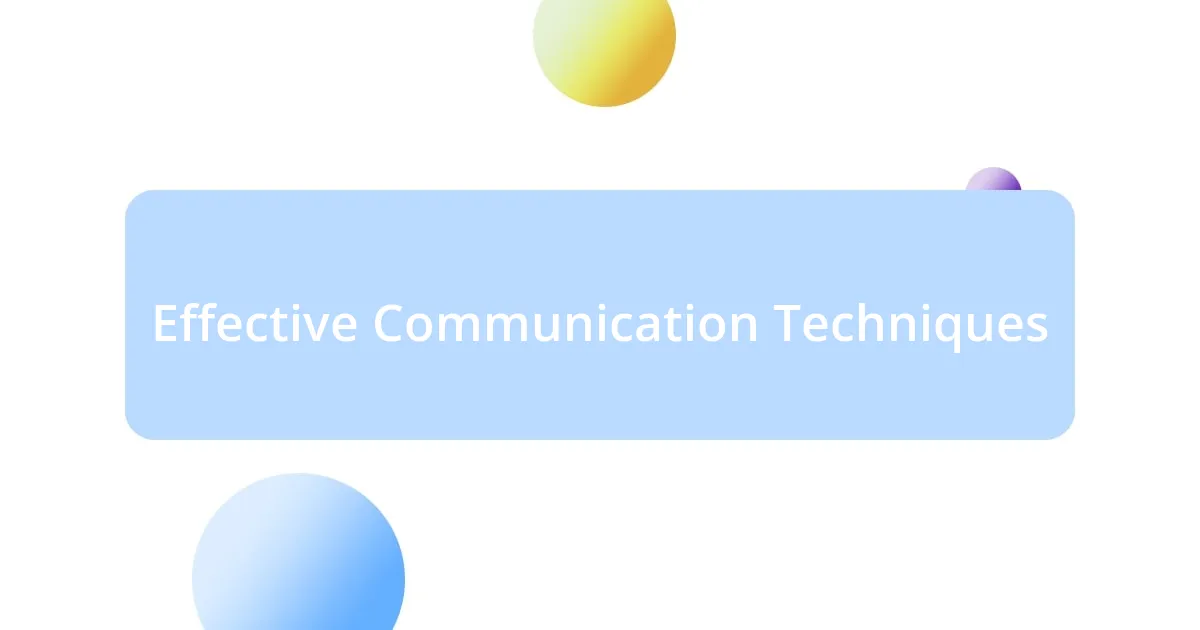
Effective Communication Techniques
Effective communication in handling guest complaints is pivotal in transforming a challenging situation into a positive interaction. I recall a time when a guest approached me regarding a mix-up with their room. Instead of diving into a barrage of explanations, I took a step back and asked, “Could you share what you were expecting?” This simple question not only made the guest feel heard but gave me clarity on how to address their specific concerns effectively.
Another technique I find beneficial is mirroring the guest’s emotional tone. During one incident, a guest was frustrated due to a lengthy check-in process. Rather than maintaining a neutral demeanor, I reflected their frustration, saying, “I can see this has been really stressful for you.” By acknowledging their feelings in this way, I could foster a sense of understanding and solidarity, which opened up a path for a more meaningful conversation about their needs.
Additionally, I always make it a point to use clear and concise language during these discussions. One memorable interaction involved a guest confused about navigating our amenities. I could have used industry jargon, but instead I clearly outlined options, saying, “Let’s simplify this—you can either relax by the pool or visit our café for a quick bite. What sounds good to you?” This approach not only provided clarity but also empowered the guest to feel they were in control of their experience. Isn’t it amazing how the right words can bridge gaps and turn complaints into opportunities for connection?

Follow-Up for Guest Satisfaction
Following up with guests after addressing their complaints is where I often see a significant shift in their overall satisfaction. I remember a time when a guest had a minor issue with their room service order. A few hours after fixing it, I called them to ask how everything was. They said, “Oh, that was really nice of you to check in!” It’s a small gesture, but it makes them feel valued and appreciated—don’t you think those little touches go a long way?
One aspect I find incredibly effective is noting the follow-up conversation in our system. This helps me to have context for future interactions. I once had a guest who mentioned she was allergic to certain ingredients during her stay. The next time she visited, I made sure to greet her and say, “I remember your allergy—how was your last meal with us?” She was pleasantly surprised that we kept track of her needs. This kind of attention to detail demonstrates genuine care and fosters a deeper connection.
Moreover, I believe that timing is essential in follow-ups. Reaching out too soon might come off as insincere, while waiting too long can make the guest feel forgotten. For example, after addressing a poolside noise complaint for a family, I waited until the next afternoon to check in. When I asked how they were enjoying their stay now, the kids were all smiles, sharing how peaceful it had been since the change. It made me realize just how much a proper follow-up can solidify trust and relationships—how do you approach the timing of your follow-ups?
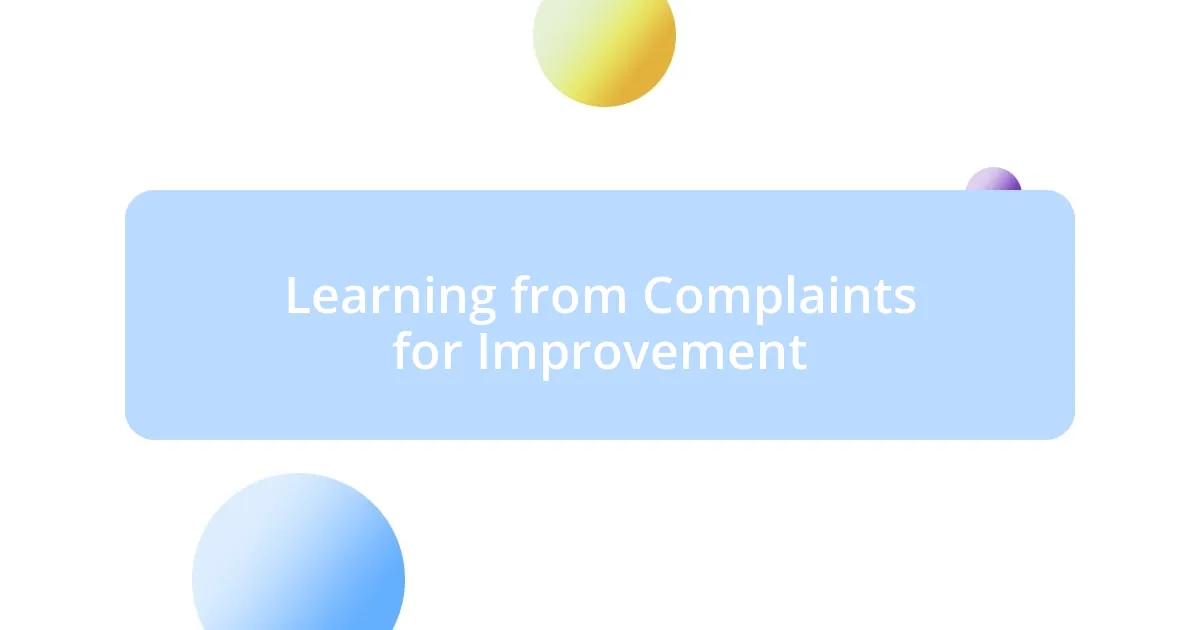
Learning from Complaints for Improvement
Learning from guest complaints is an invaluable opportunity for growth. I vividly remember an incident where a guest expressed disappointment about the cleanliness of their room. Instead of dismissing their feedback, I took it to my team in our next meeting. We examined our cleaning protocols and discovered areas for improvement. Addressing these concerns led to a noticeable uptick in guest satisfaction ratings shortly after. Isn’t it astonishing how one complaint can spark a chain reaction of better practices?
Another key takeaway is the importance of analyzing recurring issues. For instance, several guests mentioned the same problem with Wi-Fi connectivity during my tenure at a hotel. Rather than letting this slide, I brought it up with management, which ultimately led to an upgrade in our network infrastructure. This proactive approach didn’t just resolve the complaints; it transformed our reputation for reliability in the eyes of guests. Have you ever noticed how patterns in feedback can drive meaningful changes?
Finally, sharing lessons learned from complaints with the entire staff is crucial. I recall conducting a small workshop focused on empathy in customer service after a particularly challenging week filled with guest dissatisfaction. Sharing my experiences reminded everyone that we are all on the same team, working towards the common goal of enhancing the guest experience. When each staff member embraces this mindset, it fosters a culture of continuous improvement. How often do you think about the broader impact of individual complaints on your team?












